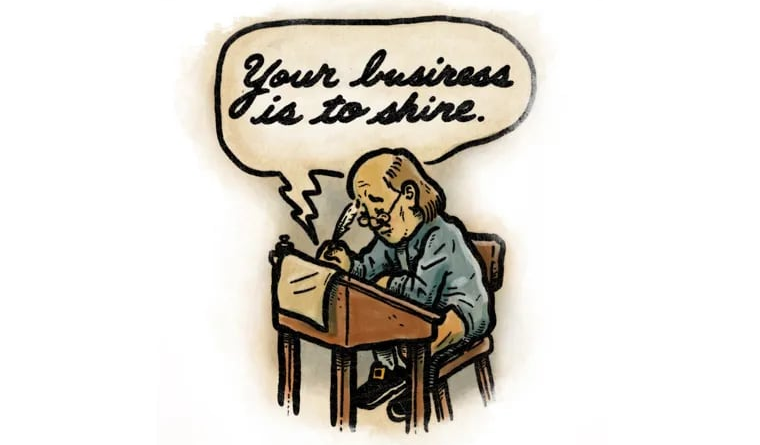Ben Franklin created the Philadelphian: 9 weird stories that prove it – The Philadelphia Inquirer
From the moment he arrived here 300 years ago this week, Franklin began drafting a blueprint for the quintessential Philadelphian.
Through no fault of his own, Benjamin Franklin was born in Boston, but it was here, in Philadelphia, where he chose to create himself.
From the moment 17-year-old Franklin got off a boat at the Market Street wharf and asked folks where to get some food, he also began drafting a blueprint for the quintessential Philadelphian.
» READ MORE: Ben Franklin would be right at home in today’s Philadelphia
While William Penn may have founded this city, it was Franklin who gave us the permission to be our unabashedly weird selves. Sure, he was brilliant and witty, but he also loved playing with dangerous things like electricity and hanging around naked.
Though he’s remembered as a statesman, Franklin wasn’t above an epic burn, and long before professional sports came here, he practically wrote the rules for being Philly fan.
On the 300th anniversary of his arrival in Philadelphia, here are nine stories that illustrate that Franklin is, and always will be, one of us.
According to his autobiography, Franklin got off the boat in Philly with shirts and stockings stuffed into his pockets and went to grab a bite to eat at a bakery on Second Street.
He asked the baker for a biscuit, “as we had in Boston,” but like a tourist requesting Swiss on a cheesesteak today, he was informed that a biscuit wasn’t a thing in old-timey Philly.
When Franklin’s request for a threepenny loaf was denied, too, he told the baker to give him whatever he could for the money he had.
“He gave me, accordingly, three great puffy rolls,” Franklin wrote.
With no room in his pockets, Franklin walked up Market Street “with a roll under each arm, and eating the other,” something Philadelphians still do today with soft pretzels.
Those who passed by Franklin’s house back in the day may have seen more of the Founding Father’s, um, lightning rod, than they expected.
Franklin liked to hang around his house naked with the windows open, but instead of calling it exhibitionism, he called it an air bath. Finding cold water “too violent” Franklin preferred to bathe in cold air.
“With this view I rise early almost every morning, and sit in my chamber, without any clothes whatever, half an hour or an hour, according to the season, either reading or writing,” Franklin wrote to a friend.
While Franklin is known for his experiments with electricity, he once penned an essay about another ubiquitous force of nature: farts.
Known as “To the Royal Academy of Farting” or “Fart Proudly,” the satirical, pun-filled essay argues that the scientific community (which Franklin thought took up too many impractical questions) should look into a way to make farts smell pretty.
Franklin wrote that if asparagus makes urine smell bad and turpentine makes it smell like violets, “why should it be thought more impossible in Nature, to find Means of making a Perfume of our Wind than of our Water?”
Time to move over PGW, because Franklin was the original Philadelphia gas works.
Like many Philadelphians today, Franklin loved a good drink (and probably would have been an epic tailgater), but the quote most attributed to him about drinking — “Beer is proof that God loves us and wants us to be happy” — isn’t accurate.
According to the Franklin Institute, what Franklin actually wrote was: “Behold the rain which descends from heaven upon our vineyards; there it enters the roots of the vines, to be changed into wine; a constant proof that God loves us, and loves to see us happy.”
So the next time you pursue happiness through wine, raise a glass to Franklin, because (as I once saw on a T-shirt at Philadelphia International Airport), he’s “Ben Dranklin’.”
Franklin has a reputation as a womanizer, one that may or may not be earned, depending on whom you ask, but one thing is for certain: He felt himself so knowledgeable in the subject of taking a lover that he once penned his advice on the matter to a friend, in a letter known as the “Old Mistresses Apologue.”
While Franklin begins by saying marriage “is the most natural State of Man,” he tells his friend that if he will not marry, he should “prefer old Women to young ones.”
Franklin outlines eight reasons why, including that older women have more knowledge, are more “tender” and “useful,” and there is “no hazard of Children.”
Franklin goes on to write about how when the body ages, it does so from the head down, with “the lower Parts continuing to the last as plump as ever.”
“ … it is impossible of two Women to know an old from a young one. And as in the dark all Cats are grey,” he actually really wrote.
He ends the piece by writing that older mistresses are better because “They are so grateful!!” (yes, with two exclamation points!!)
I bet Franklin never said that to a woman or we’d have more portraits of him with a black eye. That being said, if you’ve ever online-dated in Philly, you’ve swiped left on guys like Franklin more than a few times.
During Franklin’s time, electricity was still a novelty used mostly for parlor tricks, and while Franklin did pursue it as a scientific study, he wasn’t above playing with electricity for kicks, either, according to the American Physical Society.
Once during a dinner party he shocked a turkey to death and roasted it using an electric rotisserie-like device he created. But Franklin didn’t stop there; he also electrified his guests’ drinking glasses to administer small shocks and had them play a game he invented called “Treason,” where they had to remove a crown from an electrified portrait of the king without getting zapped, the society said.
So when you see Philadelphians climbing light poles today, know our love of foolishly playing with electricity goes way back.
While in England, Franklin once had his wife, Deborah, ship him a pet squirrel from Philadelphia that he gave as a gift to the child of a family he was close with, because that was a thing back in his day.
The squirrel, named Mungo, eventually escaped and met a cruel fate at the mouth of a dog, prompting Franklin to write an epitaph for the rodent, whom he noted had “a good Education, had travell’d far, and seen much of the World.”
Given the videos I’ve seen of people with pet squirrels and raccoons on leashes in Philadelphia, it’s mildly comforting to know that keeping such animals as pets is nothing new around here.
Franklin was a known prankster, and, as one reader noted, may have been the original Philly troll. Perhaps no story better illustrates this than Franklin’s long-running feud with Titan Leeds, a rival almanac editor in Philadelphia.
In his first edition of Poor Richard’s Almanack, Franklin, writing under the pseudonym Richard Saunders, predicted that Leeds would die at 3:29 p.m. on Oct. 17, 1733.
Leeds, who had no plans to die and by all accounts did not, called Saunders a fool and liar in a subsequent issue of his almanac. Franklin, in turn, wrote that the Leeds he knew was “too well bred” to level such cruel words and thus, posited that Leeds really was dead and that someone else was continuing to write under his name for profit.
Franklin kept up the joke for years, even after Leeds’ actual death in 1738.
It wasn’t until 1740 that Franklin put his long-running troll to bed by claiming that Leeds’ spirit came to him in a dream, entered his brain by way of his left nostril, and (like a scene out of Ghost) used his hands to write a letter admitting he had indeed died on the predicted date and Saunders was right all along.
A man ahead of his time, Franklin wrote the blueprint for being a Philly sports fan with his satirical piece: “Rules for Making Oneself a Disagreeable Companion.”
“Your Business is to shine; therefore you must by all means prevent the shining of others, for their Brightness may make yours the less distinguish’d,” he wrote.
Franklin suggests taking over entire conversations and talking about yourself and your victories as much as possible. If someone does manage to get a word in, immediately “contradict and raise a Dispute upon. Rather than fail, criticise even his Grammar.”
If someone does say “an indisputably good Thing,” Franklin advises to ignore it or claim that someone else said it first.
“When modest Men have been thus treated by you a few times, they will chuse ever after to be silent in your Company; then you may shine on without Fear of a Rival,” the unrivaled Philadelphian wrote.



